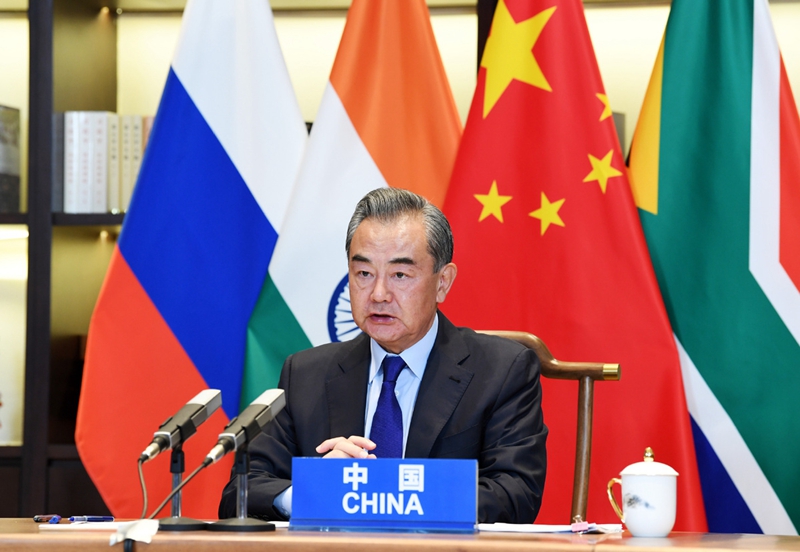BRICS defends true multilateralism

Chinese State Councilor and Foreign Minister Wang Yi speaks during a virtual meeting of foreign ministers of the BRICS countries in Guiyang, Guizhou province, June 1, 2021. [Photo/Xinhua]
The joint statement on strengthening and reforming the world's multilateral system issued after the video conference of the foreign ministers of BRICS on Tuesday was a confidence-inspiring response to address the world's growing trust and governance deficits.
In stark contrast to the United States, which sows discord under the cloak of multilateralism, by taking advantage of almost all multilateral meetings and platforms to isolate those countries disagreeable to its eyes, the foreign ministers of Brazil, Russia, India, China and South Africa have demonstrated what real multilateralism is.
By upholding the banner of multilateralism, the Joe Biden administration is trying to draw a demarcation line between itself and the previous administration, and sugarcoating the divisive moves it has inherited from the Donald Trump administration in a bid to draw its estranged allies over to its side again.
As the development of the various kinds of cooperation and exchange mechanisms of BRICS over the past two decades indicate, real multilateralism promotes solidarity.
As the BRICS foreign ministers indicated in their statement, multilateralism is not exclusive of any country. Rather it is inclusive of all countries, and is based on the norms of the United Nations Charter. It aims to promote win-win cooperation, mutual understanding and trust.
Reality has not conformed to this ideal, as the multilateral systems and platforms involving the US are either legacies of the Cold War — NATO and Five-Eye Alliance for example — which view world affairs through a distorting lens, or else new geopolitical tools engineered by the US to serve its own narrow ends, such as the so-called Quad made up of the US, Japan, Australia and India. Not to mention the large numbers of rights, financial, industrial and technological organizations on which Washington holds court behind the screens to stealthily serve the US hegemony.
As such, as State Councilor and Foreign Minister Wang Yi has urged in his speech at Tuesday's virtual meeting, it is imperative that BRICS serve as a model of true multilateralism by pursuing extensive consultation, joint contribution and shared benefits instead of hegemony, bullying and zero-sum games. It should embrace openness, inclusiveness and win-win cooperation, instead of bloc politics and ideological confrontation.
Be it the COVID-19 pandemic prevention and control efforts, boosting the post-pandemic global economic recovery, or resolving common challenges and regional issues, the three major tasks the BRICS foreign ministers focused on in their virtual meeting, it is important that the five countries, as representatives of emerging markets and developing countries, stay people-centered, action-motivated and solution-oriented, and refrain from empty talk, so that they can produce more concrete outcomes to show the power of true multilateralism.